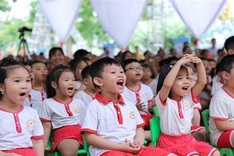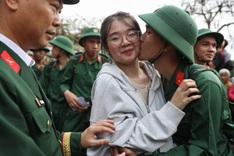
Leaders of delegations pose for photographers during the group photo session of the Nuclear Security Summit April 13, 2010 in Washington, DC. Alex Wong/Getty Images/AFP
US President Barack Obama told world leaders Tuesday to agree on locking down atomic bomb materials to prevent the "catastrophe" of nuclear terrorism.
"Today is an opportunity, not simply to talk, but to act," Obama said. "Not simply to make pledges, but to make real progress for the security of our people."
Obama was addressing the leaders of 46 nations on the second day of the summit in Washington, the biggest summit hosted by a US president in more than six decades.
The US president wants the world's military and often loosely guarded civilian stockpiles of uranium and plutonium to be accounted for and secured within four years.
Saying that terrorists could kill thousands with radioactive material just "the size of an apple," Obama warned that talk was not enough.
"Nuclear materials that could be sold or stolen and fashioned into a nuclear weapon exist in dozens of nations," Obama said.
"Terrorist networks such as al-Qaeda have tried to acquire the material for a nuclear weapon, and if they ever succeed, they would surely use it," he said.
"It would be a catastrophe for the world -- causing extraordinary loss of life, and striking a major blow at global peace and stability."
 | |
Vietnam shares concern over the threat of nuclear terrorism Vietnam shares the international community’s concern over the threat of nuclear terrorism, said PM Nguyen Tan Dung in his keynote speech at the Nuclear Security Summit which opened in Washington DC on April 12. The Vietnamese Government chief also confirmed, in front of 47 top leaders from countries around the world, that Vietnam strongly condemned terrorist acts of all kinds and fully supports the global counter-terrorism efforts on the basis of international laws and the UN Charter. Nuclear terrorism is a menacing challenge and the international community needs to take cohesive and effective actions to safeguard nuclear security, the PM stated. He informed that Vietnam has issued series of legal provisions to secure nuclear safety and security, and to ban illegal trading of materials for the production of mass destruction weapons, including nuclear weapons. The Vietnamese leader called on the international community to further assist the countries which request for measures to counter terrorists and guarantee nuclear security. The first session of the Nuclear Security Summit which was summoned by US President Barrack Obama, took place on April 12, focusing on the threat of nuclear terrorism. - VGP | o |
Leaders at the summit were expected to issue a joint communique pledging coordinated action on locking down the world's nuclear stockpiles.
On Monday, ex-Soviet Ukraine gave Obama's initiative a relatively small, but concrete boost by pledging to surrender all its weapons-grade uranium. Canada announced a similar plan, as had Chile earlier.
The two-day gathering also saw Obama meet Monday with Chinese President Hu Jintao for talks on Iran's nuclear program, which Washington says is masking a secret bomb-making drive.
The United States is pushing for new UN sanctions against Iran. The support of China, a big economic partner of Iran and also a veto-wielding member of the UN Security Council, is crucial.
Iran says it is pursuing only civilian power capability and has refused international calls to halt its controversial uranium enrichment program, and place its nuclear program under international supervision.
On Tuesday, China reaffirmed its long-held skepticism about the need for sanctions against Iran.
"China always believes that dialogue and negotiation are the best way out for the issue. Pressure and sanctions cannot fundamentally solve it," foreign ministry spokeswoman Jiang Yu told reporters.
But a top White House official said Obama and Hu had agreed their delegations would work together at the United Nations.
"They are prepared to work with us," said Jeff Bader, Obama's top official responsible for East Asia on the National Security Council.
"The two presidents agreed the two delegations should work together on sanctions."
The New York Times reported that Obama was offering to help China maintain steady fuel deliveries if sanctions against Iran led to a disruption of oil supplies.
Obama assured Hu that he was "sensitive to China's energy needs," the Times said, adding that the US administration had already sounded out other oil producers to help reassure Beijing that there would be no drop in supply.
Iran, which has dismissed the Washington summit, defiantly said it was organizing its own nuclear conference to be held in Tehran on Saturday and Sunday with foreign ministers from 15 countries.
The conference was being held following a "collective will of some independent and free-willed nations to genuinely confront the use of nuclear weapons in today's world," Iranian foreign ministry spokesman Ramin Mehmanparast said, without naming the countries.
French President Nicolas Sarkozy, who is in Washington, said meanwhile that his country could never give up its nuclear weapons "on a unilateral basis, in a world as dangerous as the one in which we live today."
"I cannot jeopardize the security and safety of my country," Sarkozy told CBS News late Monday.
He also hinted that countries like the United States and Russia should take the lead in whittling down their own huge nuclear stockpiles, rather than expecting France, which has fewer atomic weapons, to disarm.
Pakistan's Prime Minister Yousuf Raza Gilani, who controls the Islamic world's only declared nuclear arsenal, also rebuffed calls to halt production of fissile material.
Instead, Gilani made a new pitch to the United States -- which relies on Pakistan in its campaign against Islamic extremists -- to support the blackout-plagued nation in developing civilian nuclear power.
"I assure you that Pakistan, as a responsible nuclear state and an emerging democracy, stands with the international community in its effort to make this world a better place to live in," Gilani told reporters.
The United States and Russia, meanwhile, were to sign an accord Tuesday on eliminating plutonium reserves, enough "for several thousand nuclear weapons," according to the State Department.




















